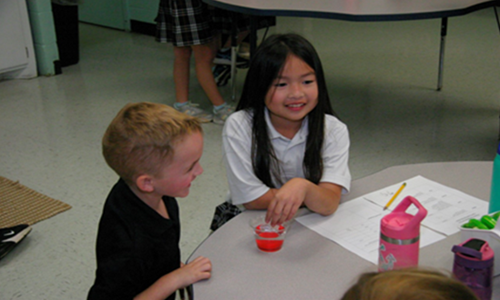
Second-Grade Students’ Achievement and Engagement in Inquiry-Based Learning: An Exploratory Study
Abstract
Keywords
Full Text:
PDFReferences
Abdi, A. (2014). The Effect of Inquiry-Based Learning Method on Students’ Academic Achievement in Science Course. Universal Journal of Educational Research, 2(1), 37–41.
Alghamdi, A. K. H. (2017). The effects of an Integrated Curriculum on Student Achievement in Saudi Arabia. Eurasia Journal of Mathematics, Science and Technology Education, 13 (9), 6079-6100.
Aran, D. (2024). Helping Future Schoolteachers Discover and Teach Soil: An Example of Project-Based Learning. Spanish Journal of Soil Science, 14.
Aydın, G. (2020). The Effects of Guided Inquiry-Based Learning Implementations on 4th Grades Students And Elementary Teacher; A Case Study. Elementary Education Online, 19(3), 1155–1184.
Banchi, H. & Bell, R. (2008). The Many Levels of Inquiry. Science and Children, 46(2), 26-29.
Barton, A., & Tan, E. (2020). Levels of Engagement in Learning Science: What They are and How to Support Them. Science and Children, 58(7), 28-33.
Dobber, M., Zwart, R., Tanis, M., & van Oers, B. (2017). Literature Review: The Role of The Teacher in Inquiry-Based Education. Educational Research Review, 22, 194–214.
Firman, M. A., Ertikanto, C., & Abdurrahman, A. (2019). Description of Meta-Analysis of Inquiry-Based Learning Of Science In Improving Students' Inquiry Skills. Journal of Physics: Conference Series, 1157 (2).
Hana, L., & Ima, R. (2020). Integrated STEM through Project Based Learning and Guided Inquiry on Scientific Literacy Abilities in Terms of Self-Efficacy Levels. Al Ibtida: Journal Pendidikan Guru MI, 7(1), 19–32.
Hong, J.-C., Hwang, M.-Y., Tai, K.-H., & Tsai, C.-R. (2017). An Exploration of Students’ Science Learning Interest Related to Their Cognitive Anxiety, Cognitive Load, Self-Confidence and Learning Progress Using Inquiry-Based Learning With an iPad. Research in Science Education, 47(6), 1193-1212.
Krajcik, J. S., & Shin, N. (2018). Project-Based Learning. International Handbook of Research in History, Philosophy and Science Teaching. 1413-1441.
Jiao, X., Liu, Z., Zhou, H., & Cai, S. (2022). The Effect of Role Assignment on Students’ Collaborative Inquiry-based Learning in Augmented Reality Environment. International Conference on, ICALT, 349–351.
Lee, H. S., & Lee, J. K. (2020). Developing Middle School Students’ Understanding of Scientific Practices Through Inquiry-Based Learning Activities. Research in Science Education, 50(2), 573-597.
Lu, S.-Y., Lo, C.-C., & Syu, J.-Y. (2022). Project-Based Learning Oriented STEAM: The Case of Micro–Bit Paper-Cutting Lamp. International Journal of Technology and Design Education, 32(5), 2553-2575.
Morales, M., Acosta, K., & Rodríguez, C. (2022). Teacher's Role and Scientific Inquiry: Analysis of an Experience About Pests in a Chilean Rural School. Revista Eureka, 19(2).
Morgan, E. (2013). Next Time You See a Pill Bug. NSTA Kids.
Oliver, M., McConney, A. & Woods-McConney, A. (2021). The Efficacy of Inquiry-Based Instruction in Science: a Comparative Analysis of Six Countries Using PISA 2015. Res Sci Educ 51, 595–616.
Pedaste, M., Mäeots, M., Siiman, L. A., de Jong, T., van Riesen, S. A., Kamp, E. T., Manoli, C. C., Zacharia, Z. C., & Tsourlidaki, E. (2015). Phases of Inquiry-Based Learning: Definitions and the Inquiry Cycle. Educational Research Review, 14, 47–61.
Sampson, V., & Blanchard, M. R. (2020). Levels of inquiry: A framework for designing science units. Science and Children, 58(7), 22-27.
Schmerse, D., Dominke, H., Mohr, J., & Steffensky, M. (2024). Children’s Understanding of Scientific Inquiry: The Role of Instructional Support and Comparison Making. Journal of Educational Psychology, 116(2), 233–255.
Setyawan, A., Aznam, N., Paidi, & Citrawati, T. (2020). Influence of the Use of Technology Through Problem-Based Learning and Inkuiri Models are Leading to Scientific Communication Students Class VII. Journal of Technology and Science Education, 10 (2), 190-198.
Solé-Llussà, A., Aguilar, D., & Ibáñez, M. (2022). The Effect of an Instructional Intervention Based on the Use of Video-Worked Examples to Promote Elementary Students’ Science Process Skills. International Journal of Education in Mathematics, Science and Technology, 10 (3), 753-772.
Stewart, M. (2015). National Geographic Kids - Robotlar. Beta Kids.
Van Uum, M. S. J., Verhoeff, R. P., & Peeters, M. (2016). Inquiry-Based Science Education: Towards a Pedagogical Framework for Primary School Teachers. International Journal of Science Education, 38(3), 450-469–469.
White & Frederiksen (1998) – Question, Predict, Experiment.
Wu, L., Liu, Y., How, M.-L., & He, S. (2023). Investigating Student-Generated Questioning in a Technology-Enabled Elementary Science Classroom: A Case Study. Education Sciences, 13(158), 1-18.
Zheng, Y., Yu, S., Zhang, M., Wang, J., Yang, X., Zheng, S., & Ping, X. (2022). Research on Performance Assessment of Students’ Inquiry Skills in China’s Elementary Schools: a Video Analysis of Beijing Discovering Science Around us. Research in Science & Technological Education, 1–27.
DOI: http://dx.doi.org/10.31258/jes.8.2.p.173-186
Refbacks
- There are currently no refbacks.
Copyright (c) 2024 J> Jeremy Winters, Katie M. Schrodt, Tracey Huddleston

This work is licensed under a Creative Commons Attribution 4.0 International License.
Publisher: FKIP Universitas Riau












